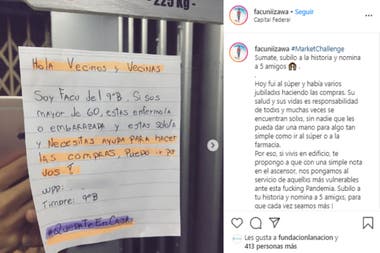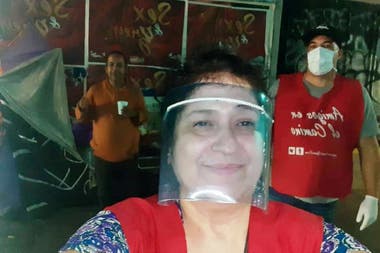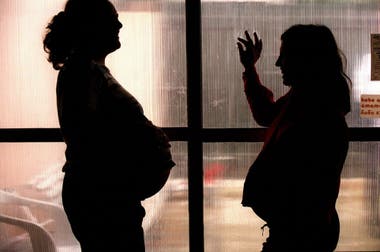It’s eight o’clock at night, Mérida walks from her job in Recoleta to the pension where she lives, in Palermo. She is thinking about her thousand earrings when a woman over 80 years old, yells at her from the window of a building: “Sir, sir!”. It does not turn around. Think they are talking to someone else. “Ma’am, ma’am!” The voice repeats in search of an answer. Merida is undeterred. “Miss, please!”, The woman tries again. “Is she talking to me?” She thinks as she approaches, her face half covered by her mask.
-Sorry, but I don’t see you well. Sir or miss? the woman asks.
“Neither of them,” Merida replies.
“Ah, very good: person, then,” says the lady without problems.
Mérida remembers the anecdote with a smile. She is 26 years old and in 2015 she was able to put into words the way she has always perceived herself: how a non-binary person. It was a long road that began in his childhood, in the feeling that he did not fit in the boxes “of the pink and the light blue”, in the discomfort with the gender and the name that he was assigned at birth – and that every time he listens, he It hurts-, in the certainty that no one understood what was happening in his intimate world.
What is being non-binary? “The simplest thing to explain to someone is: I’m a human being. Do not forget to say it, because the ‘what’ you are is a lot in these questions. I am not ‘what’, I am ‘who’. I am not a man, I am not a woman. That is to be non-binary“, Mérida details. The lady who yelled at him that afternoon for help, understood quickly, without explanations.
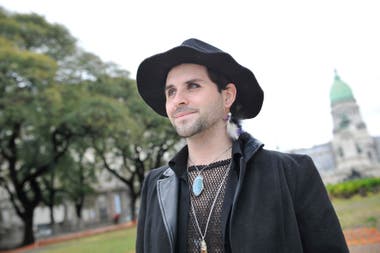
For years, Mérida has been an activist in non-binary spaces and co-founded the group Siendo Humanes. With the conviction that violence and discrimination leave traces forever, its objective is to accompany and contain diverse children and their families, in addition to dedicating itself to research, awareness and dissemination.
Neither “she” nor “he”: elle
When she meets someone, one of the first things Mérida asks, in her soft and friendly voice, is: “What pronoun do I address you with?” In your case, like some non-binary people, choose the neutral: elle. Others, on the other hand, feel identified with the feminine or masculine pronouns. “No binarie is an umbrella that encompasses a lot of identities and feelings. It is a kind of spectrum that goes from what is marked as a woman, to what is marked as a man -detail-. Many of us believe it as unique to our gender: it is like each who feels it “.
For Mérida, non-binary language implies infinitely more than using the “e”, it is the way to embrace the rainbow of diversities. To include and resignify, to make visible and not to discriminate. Because she understands that what is not named, is denied. Along these lines, he maintains that the invisibility of non-binary identities is the main prejudice that weighs on this group. “Literally, it is thought that we do not exist. Today we talk a lot about trans people, for example, but we continue to live in secret with non-binaries “, she emphasizes.
In her childhood, Mérida felt that she did not fit in. This is how they were made to feel at school – where the violence endorsed by teachers was of all kinds – and later in other areas, such as work. She was born in Guaymallén, Mendoza, in 1993 and into a privileged family. Her father – that’s what Mérida calls her – is a member of the armed forces and her mother, a housewife. “I was very rare as a child, I don’t know how to explain it, but I can summarize it like this: my father used to beat me so that I would adjust in some way to what ‘being normal’ was like. That is, what they expected from a person who was born with a penis, “he says. And he adds: “In my adolescence, I tried to be a man with all my might to fit inWho doesn’t try That hurt me a lot. “
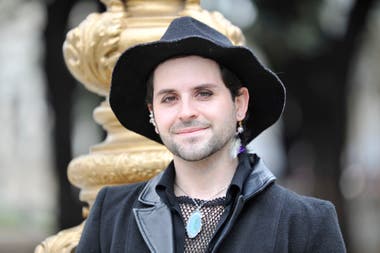
Thanks to the impulse of activisms, such as assemblies and groups made up mainly of young people, today much more is known about non-binary identity. But even so, phrases like “it is impossible that you are neither a man nor a woman” are still everyday. Not being able to access a DNI that reflects their identity and name, is for Mérida one of the main violations of the rights of those who do not perceive themselves as men or women: so far, the few cases that managed to circumvent the bureaucracy, did so through presentations before the Justice.
Mérida experienced these barriers firsthand. One day he went to the offices of commune 14 in the city of Buenos Aires and tried to do the procedure. On the other side of the counter, she ran into ignorance: “But you wear a beard,” they told her. Frustration welled up in tears. She left empty-handed. Consider that linking gender expression (the way we show ourselves to the world through our name, how we dress, behave or interact) with gender identity (how we perceive ourselves), is another of the great prejudices. “As I often wear a beard, they don’t stop treating me like a man, even if I have a dress and a good pair of heels,” he details.
Ties as a support
When Mérida was 14 years old, she went to live with her grandmother, who obtained her guardianship. It was an escape from the violence of her home. In 2015, when she was able to put her identity into words, the Equal Marriage law had just been passed. Soon after, she moved to Buenos Aires and, the house of Cristina, an aunt who lives in Caseros, was her refuge: one of the first places where she could feel free. She was the first to publish photos on her Facebook where Mérida fully appeared as Mérida: It was “his niece” and there was nothing to hide.
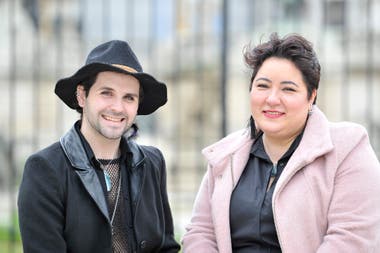
That unconditional support was key. Also that of many people she met in activism, such as her friend Eugenia Prieto, who is 42 years old, is a member of the Siendo Humanes Family Commission – which is called Letting Be – and is the mother of León, an 8-year-old trans boy. When they met, the connection was immediate. At first, Eugenia had a hard time understanding what Merida’s non-binary identity implied. I thought it was a trans woman.
“She was important in order to stabilize me, feel better and open myself to the world. This world does not make it easy for you to be you, it scares you and you even doubt what you feel,” Mérida reflects. “When you gain confidence and surround yourself with people who contain you. and they accompany you from love, even if they don’t understand you at first, everything changes. “
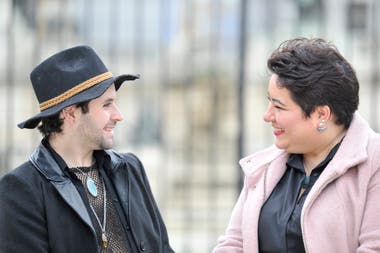
For Eugenia, that friendship implied enormous learning. “As a mom, what moves me most about hearing stories of trans and non-binary childhoods is that they always have a sad memory of their childhood,” she says. León was born in 2012, a few months after the gender identity law was enacted, and since before the age of 2 he already expressed his disagreement with the gender assigned to him at birth. “I think the fear of the gaze of others multiplies when you realize that your child is a trans childhood, because you know all the prejudices that there are and that terrifies you: to think that you are going to grow up and have to face a world that is still binary, violent and macho“says Eugenia.
Currently, Mérida works with an elderly person with Parkinson’s and is doing the CBC at the Faculty of Psychology of the UBA. In addition, he divides his time between activism, a choir, volunteering accompanying deaf people (in his adolescence he learned sign language), Being Humanes and other groups that he integrates. Although many in his family have a hard time understanding his identity,. don’t lower your arms. It took his mother a while to begin to respect his pronoun and to be able to say “it’s my daughter” and, for his grandmother, it costs more, so they look for alternatives such as nicknames. “We are in the process,” says Mérida, calmly. Just as Eugenia understood one day that León was always León, Mérida has the certainty that her family will understand that it was always Mérida.
Sources
- Being Humans
- Diverse Families
- CHA
Methodology. How did we do it
This article is part of a series on diversities that LA NACION will publish. The objective of this special is to make visible and raise awareness about some of the main prejudices linked to the LGBTIQA + population that are still rooted in our society and are the basis of violence and violations in access to rights of all kinds. It has the voices of some of the main referents in Argentina, as well as first-person testimonies. In addition to the qualitative interviews, an analysis of statistical data and a compilation of works prepared by different government organizations and civil society were carried out. The sources were sought to be representative of the territorial and cultural realities of the country, as well as the diversity of sexual orientations and gender identities that exist. The special also has an audiovisual production to bring the voices and images of the protagonists closer, where the focus is on life stories and the role of emotional ties.
According to the criteria of
More information
.
Publicado en el diario La Nación

